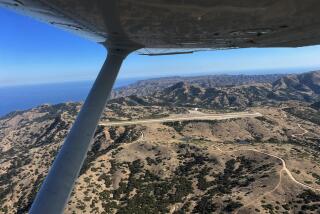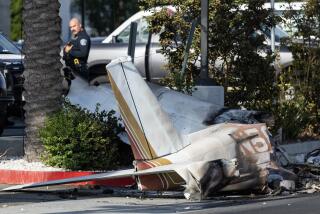Navy jet crash: Why no fatalities? Luck and skill, officials say
VIRGINIA BEACH, Va. — A supersonic military jet fighter crashes into a densely populated urban neighborhood at mid-day. Flames erupt. At least 40 apartments are destroyed or damaged.
But, miraculously, no one is killed. Only seven people, including the two aviators aboard, are injured, none seriously.
How is that possible? Civilian and military officials in this military town were struggling Saturday to answer that question, less than 24 hours after a Navy F/A-18D Hornet on a training mission slammed into an apartment complex just after noon Friday. Fire department officials announced Saturday morning that three residents unaccounted for Friday night had been located and that all residents of the complex were safe.
PHOTOS: Navy jet crashes into apartments in Virginia Beach
“I think it’s an act of divine providence,” Virginia Gov. Bob McDonnell told the Virginian-Pilot newspaper.
Other officials attributed the absence of fatalities to good luck, regular crew and emergency training, a quick response by police and fire departments and the coolheaded assistance of people in the apartment complex. One of the pilots, still attached to his parachute, was helped by residents, many of whom escorted neighbors to safety in the chaotic moments after the crash.
Fire department officials said the fire was not as bad as it could have been because much of the plane’s fuel was dumped just before the crash. The Navy said it was not yet clear whether that was because of mechanical malfunctions or because of actions taken by the two aviators before they parachuted to safety. And because the plane crashed on a weekday afternoon, many residents were at work or away on errands.
“We’re blessed,” Virginia Beach Mayor Will Sessoms said after touring the crash site.
Navy Capt. Mark Weisgerber of the U.S. Fleet Forces Command, who said the two-seat Hornet experienced a “catastrophic mechanical malfunction,” praised the crew for taking decisive action. “The mitigating factor in this is there was an eminently well-trained and qualified teacher in the back seat” of the doomed plane, he said.
Witnesses interviewed at the scene said police and fire crews were at the site within minutes, moving residents to safety with the assistance of neighbors, many of whom are in the military and work at bases in the area. The raging fire was under control in about an hour, witnesses said.
Military and civilian first responders train regularly for just such catastrophes, emergency officials said Saturday. As recently as December, crews trained together during a drill at a nearby military base, working to put out a training fire at a simulated plane crash and treating mock casualties.
After searching all apartments damaged or destroyed in the crash, emergency officials said Saturday morning that they had accounted for all residents of the Mayfair Mews complex. They were still trying to determine whether anyone visiting the at the time of the crash was missing.
“I’m happy to report that we don’t have any reports of missing people at this time,” Virginia Beach Fire and Rescue Battalion Chief Tim Riley said at the scene. “We are transitioning from a search and rescue to an investigation.”
Navy officials said Saturday they were continuing to investigate the cause of the crash.
Six people, including one of the two pilots, were treated at a local hospital and released Friday. The other aviator was released Saturday. The Navy described his injuries as relatively minor and said he was doing well.
A student pilot was in the front seat of the jet and the experienced instructor was in the rear, the Navy said. One of them apologized for the crash to residents who assisted him, a witness told reporters.
The charred wreckage of the plane was clearly visible from the street Saturday morning after police took down much of the cordon they had set up Friday. Just behind the remaining yellow police tape, the Hornet’s fuselage and twin-finned tail section lay on a grassy courtyard next to a blackened tree and badly burned brick, two-story apartment buildings.
The faint scent of jet fuel was still present Saturday morning.
Just 30 feet away from the plane, other apartments seemed untouched. On several balconies, chairs, tables and plants were arranged as if nothing had happened. The complex is populated mostly by elderly people. Many residents of an adjacent apartment complex, Birdneck Village, work at military bases.
The tree-lined neighborhood is about two miles from Naval Air Station Oceana, where the Hornet had taken off just after noon Friday. It crashed moments later.
Built at a cost of about $29 million, the F/A-18D is a twin-engine supersonic fighter plane with a 40-foot wingspan capable of flying at speeds up to Mach 1.8, according to its manufacturer, Boeing Co.
Early Saturday morning, John Santoni, 46, a marine mechanic who works at a local Navy base, pressed against the yellow police tape, trying photograph the wreckage. His girlfriend, Sarah Uphold, a schoolteacher, lives in the complex but had left town Thursday night on spring break, he said.
“She’d kill me if I didn’t tell her what happened to her apartment,” Santoni said as he tried, and failed, to persuade a police officer to take his camera and get a closer shot.
Uphold’s apartment appeared undamaged, Santoni said. It was rebuilt last year after a fire destroyed the unit and the apartment above it, he said. The Hornet had slammed down less than 100 feet away, spraying jet fuel on Uphold’s parked car.
“It’s amazing,” Santoni said, staring at the wreckage. “It’s like the plane was just picked up and planted right there between all those buildings.”
ALSO:
Navy jet crash: Buffer zones sought to protect civilians
Navy jet crash: Spotlight on widely recognizable F/A-18
Brake for a stopped school bus? Many don’t. That could change
More to Read
Sign up for Essential California
The most important California stories and recommendations in your inbox every morning.
You may occasionally receive promotional content from the Los Angeles Times.











